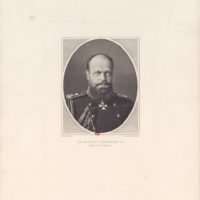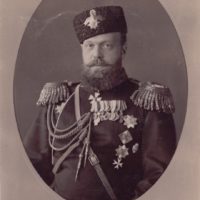
Related

Александр III, император России (1845-1894)

Александр III, Император России (1845-1894) Журнал

Князь Николай Александрович. Альбом Российской Императорской Семьи, Императорского Двора и государственных деятелей, 1865-1875 гг.

Александр III, император России (1845-1894). 1873 г.

Александр I, император России (1801–1825). Портрет.

Александр I, император России (1801–1825). Портрет.

Александр I, император России (1801–1825). Портрет.

Александр I, император России (1801–1825). Портрет.

Александр I, император России (1801–1825). Портрет.
Historical memoirs of the Emperor Alexander I and the court of Russia (1900) (14579814100)
Резюме
Count Bennigsen
Identifier: historicalmemoir00choi_0 (find matches)
Title: Historical memoirs of the Emperor Alexander I and the court of Russia
Year: 1900 (1900s)
Authors: Choiseul-Gouffier, Sophie de Tisenhaus, comtesse de, 1752-1817 Patterson, Mary Berenice, translator
Subjects:
Publisher: Chicago, McClurg
Contributing Library: University Library, University of North Carolina at Chapel Hill
Digitizing Sponsor: University of North Carolina at Chapel Hill
Text Appearing Before Image:
s of an undertaking inwhich without doubt there was more heroic exalta-tion than real and healthy policy. The beautifulQueen Louisa of Prussia, after having stimulated thecourage of the Prussian soldiers, was obliged to flee ;and being enceinte was transported on bales of cottonto the frontier of the country, — to Memel, whereshe remained, as well as the king, during the wholeof this disastrous campaign. So it was in Prussia,and she would have suffered, perhaps, by a just retri-bution from Heaven, the fate of Poland, if her nobleally, the generous Alexander, had not come to herrescue. The Russian army commanded by general Bennig-sen held back the impetuous French troops accus-tomed to march from victory to victory. The successof the battles of Pultusk and of Preussich-Eylau weredoubtful for the one as well as for the other army.Bennigsen closed the entrance of Lithuania againstNapoleon. No general fighting against this greatmilitary genius had been able to claim such anadvantage. 56
Text Appearing After Image:
COUNT BENN1GSEN. Emperor Alexander I. A great number of French prisoners were trans-ported at that time to the interior of Russia andpassed through Vilna. Their appearance excitedamong the Poles a sort of patriotic effervescence,which fortunately had no unhappy results, owingto the moderation and prudence of the governor-general and commander of Lithuania, RymskyKorsakoff.1 Warsaw, at that epoch already occupied by theFrench, was regarded as the nucleus of a new Poland,and all the patriotic feelings, all the hopes of thePoles fastened themselves upon Napoleon as the onlysovereign who had, not only the power, but the wishto re-establish the ancient kingdom of Poland. Mis-taken in the crafty character of Bonaparte, the Polesbelieved they saw in each French soldier the instru-ment of the re-establishment of their nation. As suchthe prisoners of whom I have just spoken were re-ceived throughout Lithuania, and especially at Vilna,with such lively and exaggerated marks of interestthat it wa

